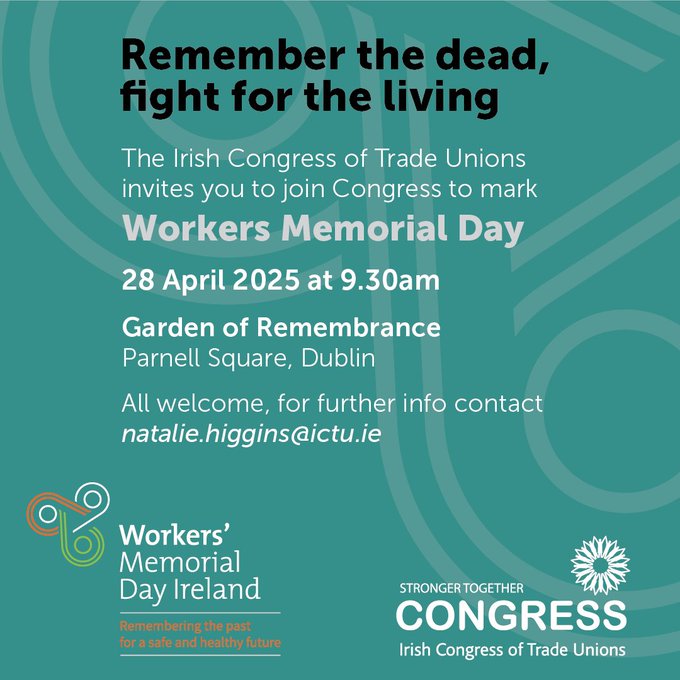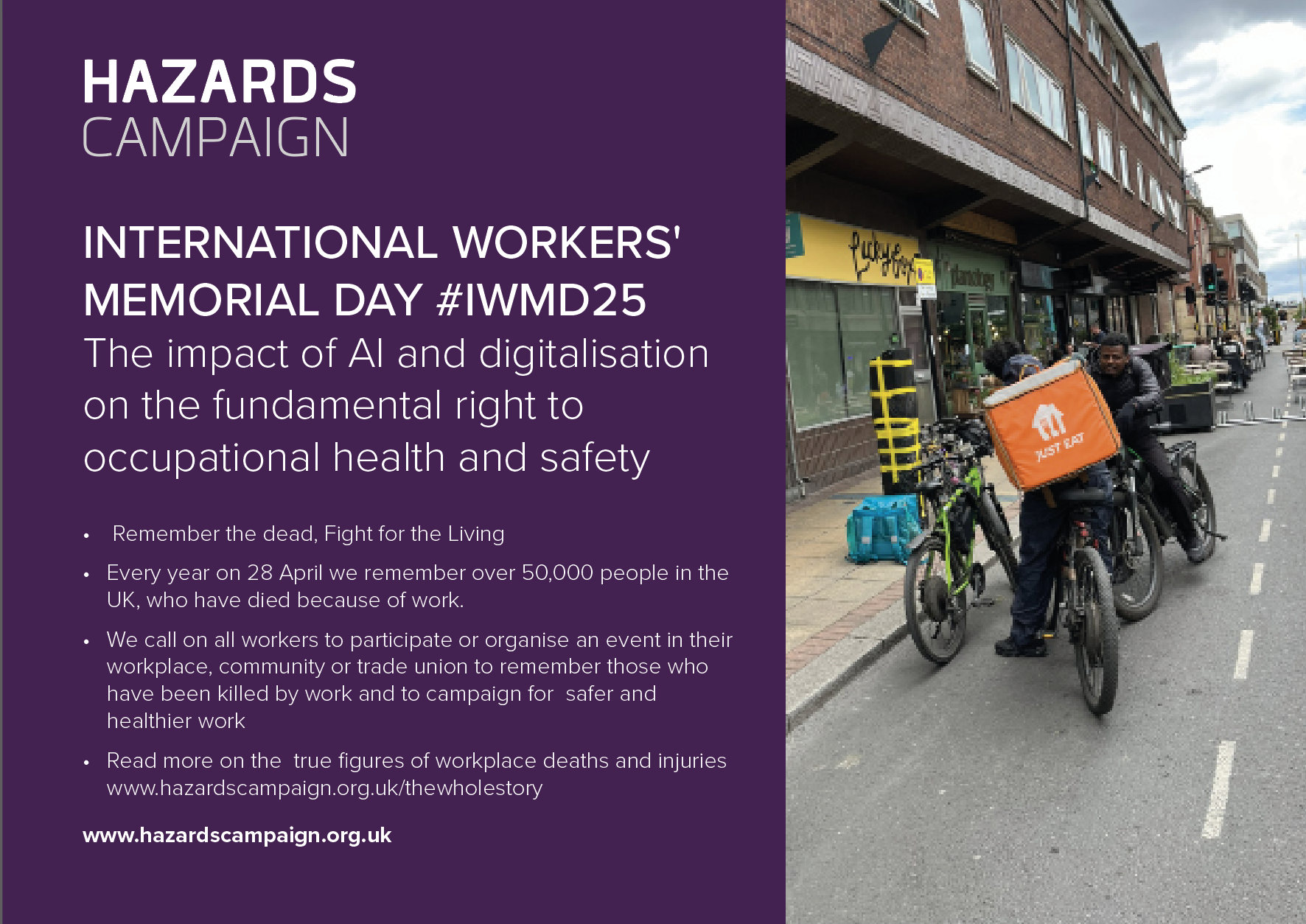
FACK Statement
International Workers’ Memorial Day 28 April 2025
Far too little
That is what we FACK families encounter all too often when it comes to achieving justice – or should we say, what passes for justice – when a loved one dies because of a work-related incident. We say “what passes for justice” because, over a 12 year period, in England and Wales there were 40 cases brought under the Corporate Manslaughter and Corporate Homicide Act.
Only 29 of which resulted in conviction. And we are unaware of any cases having ever been brought in Scotland.
Yet, when the new legislation was being considered, the Government’s Regulatory Impact Assessment estimated that there would be between 10 and 13 cases per year. So, by now, we should have expected the number of prosecutions to be in three figures. If only it were a reduction in the number of fatalities that had resulted in the much lower figure. It is not. The number of people who lose their lives because of work remains stubbornly, heart wrenchingly, high. So, it is the inadequacy of our laws and their enforcement which is to blame.
Companies do not make decisions that result in deaths. Individuals within companies and organisations do, So if a law is to serve as a deterrent, that can only be achieved by framing offences in such a way that those responsible are held accountable, that prosecutions will be brought, prosecutions will succeed and punishment then fits the crime.
As things stand, what passes for justice is far too little, and comes far too late.
We’re sure Natalie Woods McKeown would add to that “if at all”. She posted on Facebook less than 2 weeks ago about the 23rd anniversary of her dad’s death on a site where he became entangled in faulty machinery, making the heartbreaking point that she and her sister still have no answers to fundamentally important
questions. They feel they have had more than 2 decades of being let down, by the Police, prosecution authorities and the HSE. She heartbreakingly ends her post saying:
“Dad, not having you in our lives does not get any easier…23 years of injustice just adds to the pain.”
Ken Cresswell, John Shaw, Michael Collings and Christopher Huxtable left home to go to work on the demolition of Didcot Power Station. On the 9th anniversary of their deaths, Thames Valley Police issued a press release stating: “…we are confident that we are moving towards the latter stages of our enquiries.”
“Moving towards the latter stages”?? What exactly does that mean in an investigation which has already taken nearly a decade? These families have, absolutely understandably, lost all confidence in the authorities and their ability to deliver justice.
As have the wife and sister of John Mackay, who died in 2019, alongside Tommy Williams, during demolition works at a former steelworks in Teeside. When the case was handed from the police to the HSE more than 3 years on, the HSE pledged that: “our investigation will be a thorough one, while also recognising the desire for a speedy conclusion.”
Now a further 18 months down the line and Ann and Magi remain in a state of not knowing why John and Tommy died, or whether any individual or company will face criminal charges. So much for recognition of the desire for a speedy conclusion. We have said it before, and we will continue to say it until someone with the power bring about change listens and takes action: this interminable wait for answers leads to justice being delayed and denied; and the trauma of loved ones being extended and compounded.
Far too little. Far too late. Causing far too much pain.
Please let it not be thought that these injustices are faced only by the families of those who worked in high hazard environments.
85 year old June Harvey was at home in the summer of 2020, when a tower crane from a nearby construction site collapsed and devastatingly crashed through the roof and beyond, killing her. Her family still waits for answers as to why.
Simon Midgley and Richard Dyson were enjoying a weekend at Cameron House Hotel in 2017 the week before Christmas, when a fire tore through the building and tore them from their families. Recommendations for improvements to fire and hotel safety were finally made more than 5 years after their deaths. Now, a further 2 years later, Simon’s mum and sister have yet to see these recommendations turned to positive preventative action for others, only serving to deepen their distress.
0n a spring morning in 2018 Michaela Boor was walking her young son to nursery when masonry fell five storeys. The next day was her 29th birthday. The day after that, her family had to make the decision to turn off her life support machine. Michaela’s mum now walks her grandson to school, past the very sport where his mum’s, her daughter’s, life ended. He asks: “why can’t we walk past the building, nanny?” Because she always tells him to cross the road. Seven years on, no answers, and no justice, for that wee boy.
Far too little. Far too late. Causing far too much pain, that could and should have been avoided.
It could and would have been avoided if all employers cared enough about their health and safety responsibilities, preventing these “accidents waiting to happen”, which are not “accidents”.
It could and would have been avoided had our enforcement authorities – police, the HSE and local authorities – been provided sufficient resources to investigate with the necessary expediency, and wherever possible, undertake proactive preventative work to avoid incidents occurring in the first place.
It could and would have been avoided had our laws served as effective deterrents in the first place, and our justice systems been able to provide meaningful justice, swiftly.
Instead, far too many loved ones continue to lose their lives in incidents which could, should and would be prevented if only everyone cared as much as we FACKers do. We cannot and should not need to keep repeating ourselves. We are exhausted by the need to say the same thing in a different way every year. For every FACK family that comes after us, we feel we have failed them, because, despite all that we do, all that we say, history continues to repeat itself.
We need you to add your voices to ours, to influence those who can effect change, to turn platitudes into action, and to ensure that no other family ever has to go through what our families already have gone through, and what we are forever going to continue to go through.
So, as we remember the dead, we pledge to continue fighting like hell for the living.
FACK was established in July 2006, by and for families of people killed by the gross negligence of business employers, see https://gmhazards.org.uk/index.php/fack/
Founder Members of FACK:
Dawn and Paul Adams – our son Samuel Adams aged 6 killed at Trafford Centre,10th October 1998
Linzi Herbertson – my husband Andrew Herbertson 29, killed at work on 30th January 1998
Mike and Lynne Hutin – our son Andrew Hutin 20, killed at work on 8th Nov 2001
Mick & Bet Murphy – our son Lewis Murphy 18, killed at work on 21st February 2004
Louise Adamson – my brother Michael Adamson 26, killed at work on 4th August 2005
Linda Whelan – my son Craig Whelan 23, (and Paul Wakefield) killed at work on 23rd May 2004
Dorothy & Douglas Wright – our son Mark Wright 37, killed at work on 13th April 2005
For more information and to support FACK, contact Greater Manchester Hazards Centre: Unit 2, The Wesley Centre, Royce Rd, Manchester M15 5BP (UK)Telephone: 0161 884 4229 Email: mail@gmhazards.org.uk
Web: https://gmhazards.org.uk/index.php/fack/
Or the Scottish Hazards Centre: 0800 0015 022.






